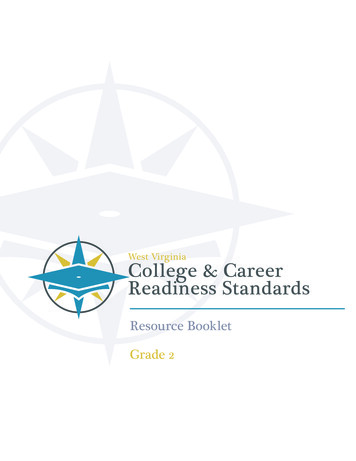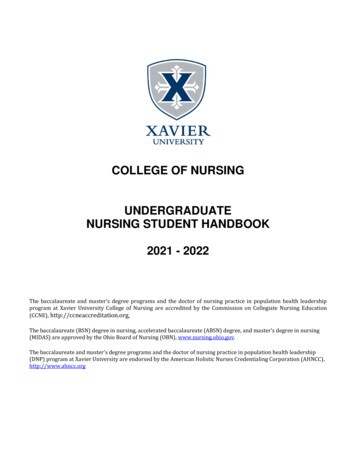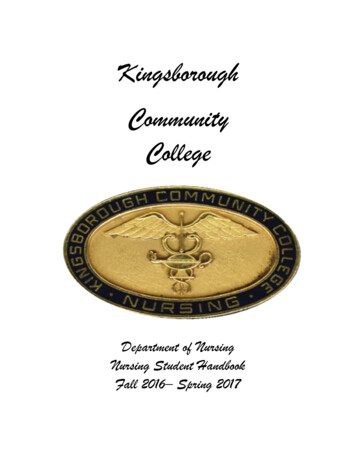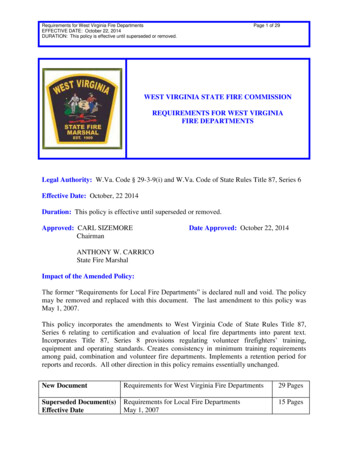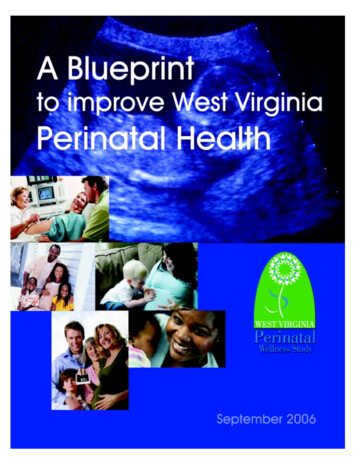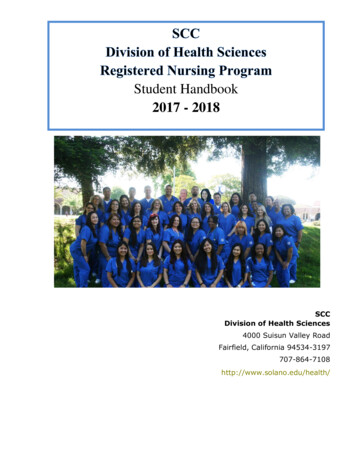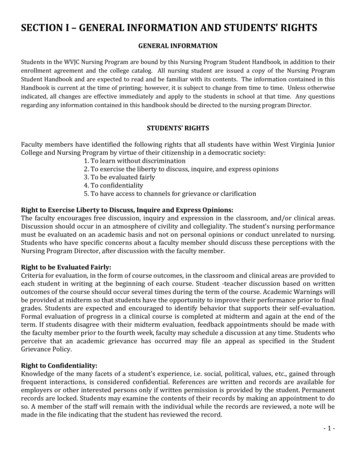
Transcription
SECTION I – GENERAL INFORMATION AND STUDENTS’ RIGHTSGENERAL INFORMATIONStudents in the WVJC Nursing Program are bound by this Nursing Program Student Handbook, in addition to theirenrollment agreement and the college catalog. All nursing student are issued a copy of the Nursing ProgramStudent Handbook and are expected to read and be familiar with its contents. The information contained in thisHandbook is current at the time of printing; however, it is subject to change from time to time. Unless otherwiseindicated, all changes are effective immediately and apply to the students in school at that time. Any questionsregarding any information contained in this handbook should be directed to the nursing program Director.STUDENTS’ RIGHTSFaculty members have identified the following rights that all students have within West Virginia JuniorCollege and Nursing Program by virtue of their citizenship in a democratic society:1. To learn without discrimination2. To exercise the liberty to discuss, inquire, and express opinions3. To be evaluated fairly4. To confidentiality5. To have access to channels for grievance or clarificationRight to Exercise Liberty to Discuss, Inquire and Express Opinions:The faculty encourages free discussion, inquiry and expression in the classroom, and/or clinical areas.Discussion should occur in an atmosphere of civility and collegiality. The student’s nursing performancemust be evaluated on an academic basis and not on personal opinions or conduct unrelated to nursing.Students who have specific concerns about a faculty member should discuss these perceptions with theNursing Program Director, after discussion with the faculty member.Right to be Evaluated Fairly:Criteria for evaluation, in the form of course outcomes, in the classroom and clinical areas are provided toeach student in writing at the beginning of each course. Student -teacher discussion based on writtenoutcomes of the course should occur several times during the term of the course. Academic Warnings willbe provided at midterm so that students have the opportunity to improve their performance prior to finalgrades. Students are expected and encouraged to identify behavior that supports their self-evaluation.Formal evaluation of progress in a clinical course is completed at midterm and again at the end of theterm. If students disagree with their midterm evaluation, feedback appointments should be made withthe faculty member prior to the fourth week, faculty may schedule a discussion at any time. Students whoperceive that an academic grievance has occurred may file an appeal as specified in the StudentGrievance Policy.Right to Confidentiality:Knowledge of the many facets of a student’s experience, i.e. social, political, values, etc., gained throughfrequent interactions, is considered confidential. References are written and records are available foremployers or other interested persons only if written permission is provided by the student. Permanentrecords are locked. Students may examine the contents of their records by making an appointment to doso. A member of the staff will remain with the individual while the records are reviewed, a note will bemade in the file indicating that the student has reviewed the record.-1-
Nursing FAQ’s1) What is Accreditation?Accreditation is a voluntary activity initiated by the institution that requires a self-evaluation and anindependent, objective appraisal of the overall educational quality conducted by an outside accreditingorganization.2) Is West Virginia Junior College Accredited?Yes. West Virginia Junior College is institutionally accredited by the Accrediting Bureau of HealthEducation Schools (ABHES). ABHES is a national accrediting agency recognized by the United StatesDepartment of Education.To achieve ABHES accreditation, an institution must: Comply with nationally recognized academic standards; Develop and implement a Program Effectiveness Plan; Undergo an annual review of its financial stability, retention and placement rates; and Undergo announced and unannounced site visits.If the institution and all its programs are judged to be in compliance with the recognized academic andother required standards, ABHES grants accreditation status to the institution. Note that individualcollege departments may also voluntarily pursue “programmatic” accreditation from programmaticaccrediting organizations for individual education programs such as nursing.3) Does WVJC’s School of Nursing have West Virginia state program approval?Yes. WVJC’s Associate Degree Nursing (ADN) program has met the standards required by the WestVirginia Board of Examiners for Registered Professional Nurses; therefore, WVJC graduates can sit forthe West Virginia NCLEX-RN exam and become West Virginia registered nurses upon passing theexam and completing the application requirements to obtain licensure.4) How does state program approval differ from program “accreditation”? Program approval means a program meets standards defined by state rules and regulations. In thecase of nursing, a program must meet rules and regulations defined by the state nurse practicelaw. State approval (sometimes referred to as state board “accreditation”) is mandatory. Program accreditation means a program meets specific standards determined by a programmaticaccrediting organization. Institutional Accreditation means the overall institution is accredited. (See paragraph #2 above)5) Is additional nursing program accreditation mandatory?No; But It Will Be. In 2018, the West Virginia Board of Examiners for Registered Nurses established apolicy requiring all nursing schools to obtain programmatic accreditation by 2022. The WVJC School ofNursing has begun the process of applying for programmatic accreditation and expects (but cannotguarantee) it will meet the deadline.6) Does the WVJC Nursing Program have additional (programmatic) accreditation?No. WVJC is institutionally accredited and the WVJC School of Nursing has received state approval tooffer its nursing program; however, the program has not pursued voluntary programmatic accreditation.However, as stated in the preceding paragraph, the WVJC School of Nursing has begun the process of-2-
applying for programmatic accreditation in response to the Board of Nursing’s newly established policy,and expects (but cannot guarantee) it will acquire the recognition by 2022.7) Why take the additional step of programmatic accreditation?Although the process is voluntary and WVJC is institutionally accredited, some employers may requirethat job applicants graduate from a programmatically accredited nursing program and some colleges anduniversities require programmatic accreditation to transfer credits and obtain advanced degrees.a. Does this affect my ability to sit for the state nursing exam or become a registered nurse?No. WVJC’s nursing program has met the standards required by the West Virginia Board ofExaminers for Registered Professional Nurses to offer a nursing program. This means WVJCgraduates can sit for the NCLEX-RN exam and become registered nurses upon passing the exam andcompleting the application requirements to obtain licensure.b. Does this affect my right to work as a registered nurse or my nursing employmentopportunities?Upon passing the NCLEX-RN and obtaining the appropriate state licensure, WVJC graduates arelicensed registered nurses and may work as registered nurses. As noted above, however, someemployers may require additional or other accreditation; so, some employment opportunities maynot be available. Be sure to review job application requirements carefully.Note – The NCLEX – RN exam is recognized throughout the country so graduates may also belicensed in other states by passing the exam and complying with the application requirements toobtain licensure in those states.c. Does this affect my ability to transfer credits?It may, depending upon the educational institution. There is a thorough explanation on transfer ofacademic credit in the catalog. Please review the information in the catalog.8) Who should I talk to if I’ve got more questions? Nursing Program DirectorWVJC School of NursingAccreditingBureau of HealthEducationSchoolsFalls Church, VA West Virginia Boardof Examiners forRegisteredProfessional NursesCharleston, WVNote: This information is accurate as of the time of publication. Check with the campus for the most currentinformation.Licensure Eligibility RequirementsLicensure Eligibility – Requirements to become a registered nurse are evolving as the practice of nursingevolves. Generally, the requirements are becoming more stringent. Before starting classes, you should goto your state nursing board website (WVBON website address is: http://wvrnboard.wv.gov) to reviewand confirm that you can meet the eligibility requirements to become a registered nurse. Be advised thatthe requirements may change between the time that you can begin school and the time you graduate andapply to become a registered nurse. Any condition that could impair your ability to carry out nursing-3-
functions may disqualify you from eligibility to become a registered nurse. This could include mental,emotional, physical, or other conditions. You should also be aware that, any abuse of legal drugs or use ofillegal drugs will be a basis for disqualification. You may be tested for inappropriate drug use while inschool, as a condition to participate in clinical rotations at some sites, and prior to receiving your nursinglicense. Once licensed, you may be required to be tested for inappropriate drug use as a condition ofemployment. (The College makes no representations, suggestions or warranties that any student is orwill be eligible for licensure. This is the sole responsibility and authority of the WVBON.)-4-
SECTION II – MISSION AND PHILOSOPHY, GOALS AND OUTCOMESMISSION AND PHILOSOPHY OF THE NURSING PROGRAMThe mission and philosophy of the Nursing Program are in agreement with the mission and philosophy ofthe West Virginia Junior College. The philosophy of the Nursing Program addresses the conceptual basisof the registered nurse curriculum as indicated in West Virginia Legislative Rule 19CSR10.MissionThe mission of the Nursing Program is to transform lives by providing access to a quality education thatwill enable the student to obtain employment as a professional, caring nurse. To achieve this mission, theNursing Program prepares graduates who will competently practice nursing, understanding thesignificance of evolving healthcare technology, and apply both professional and ethical principles withsensitivity to the diverse needs of individuals, groups and communities.PhilosophyThe faculty, staff, and administration of the West Virginia Junior College Associates Degree NursingProgram believe that all individuals are endowed with basic rights. They further believe that each studenthas the potential to learn and that, with encouragement and quality instruction, they will grow bothpersonally and professionally.The faculty of West Virginia Junior College Associate Degree Nursing Program believes that nursing isboth a science and an art. We consider the provision of nursing care, and henceforth nursing education, togreatly impact the community. We believe that ethical and moral provisions of nursing care are ofutmost importance. The “patient” is defined as any person, family or community that is experiencing anevent that impacts their physical, emotional or spiritual well-being. Our faculty shares a holisticunderstanding of health as “peace within”. We believe our nursing students are uniquely educated andexpertly skilled to positively influence clients toward the promotion of health.The nursing students at West Virginia Junior College practice competent care that is learned andexpanded upon through both didactic and clinical instruction. Education received at West Virginia JuniorCollege prepares the graduate nurse to make complex judgments and to further develop into thecompetent nurse of the future. The nursing process helps guide the nursing student and to ensuremaximum functional achievement for the patient, family and community. We, at West Virginia JuniorCollege, believe that successful nurses must display certain core characteristics. These corecharacteristics are: empathy, clinical judgment, interpreter and provider of learning to clients, familiesand communities, acceptance of diversity, and a commitment to lifelong learning. It is through mastery ofthese core characteristics that students demonstrate the ability to take part in a client’s achievement ofhealth.The curriculum at West Virginia Junior College is based on Jean Watson’s Theory of Caring. The tencarative factors are used to contrast with conventional medicine’s curative factors in an attempt to lessenthe effects of illness, promote comfort and healing and to assist clients to an optimum state of health or adeath with dignity.1.2.3.4.5.6.The formation of a humanistic-altruistic system of valuesThe instillation of faith-hopeThe cultivation of sensitivity to one’s self and to othersThe development of a helping-trusting relationshipThe promotion and acceptance of the expression of positive and negative feelingsThe systematic use of the scientific problem-solving method for decision making-5-
7. The promotion of interpersonal teaching-learning8. The provision for a supportive, protective, and (or) corrective mental, physical,sociocultural, and spiritual environment.9. Assistance with the gratification of human needs10. The allowance for existential-phenomenological forces (Watson, 1985,)The teaching learning process occurs in a supportive environment of mutual respect and honesty.Students are encouraged to take responsibility for their own learning and act as advocates for themselvesas learners as well as their clients. Learners at West Virginia Junior College Nursing Program often takethe role of “student as teacher” in order for further comprehension to occur. West Virginia Junior Collegefaculty provides competent guidance to their students in a positive and supportive manner. Ourcurriculum is reflective of the changing needs of our clients. Furthermore, we believe that faculty act asrole models to our students and each other. At our core, is our pursuit of excellence in practice andstriving for brilliance in nursing care. The educational aim of the West Virginia Junior College NursingProgram is the development of competent individuals prepared for the NCLEX-RN and subsequentresponsibilities as registered nurse. The curriculum concepts are congruent with this goal and thesebeliefs. The conceptual framework at West Virginia Junior College is Caring. Caring is essential to healing (orwellbeing) and should be the focus of nursing decisions and actions. Central to the Conceptual Framework are themetaparadigm concepts of nursing, person, health, and environment. While the metaparadigm concepts of nursing,person, health and environment form the foundation of the Conceptual Framework, the following integratingconcepts shape the curriculum: client environment, critical thinking, quality and safety, nursing process,communication, role development, relationship-centered care and collaboration and teamwork.Educatingreflective nurse professionals requires a curriculum that incorporates, core characteristics core knowledge, androle development.Metaparadigm ConceptsPerson: The concept of person is introduced in the very first courses of the nursing program and is appliedthroughout the curriculum through the application of the concept of person in relation to nursing theoryand skills and through the application of nursing care of the individual in the clinical arena in relation to thebiological-psycho-social-spiritual dimensions of care. The person or client is the direct recipient of allnursing care and basic to the concept of client needs.Health: Health, and the promotion of health, is the ultimate goal of nursing and are intertwinedthroughout the nursing curriculum. The nurse both promotes the health of the client andmaintains the health of the client through provision of nursing care based on the art and science ofnursing and the physiological and technological sciences. When the client’s prognosis is towardan impending death, the nursing care is toward providing for the client’s needs for comfort andpromotion of the client’s right to a dignified death.Environment: Environment, both the internal and external environments, has a direct effect on theperson, family, or society. Environment is addressed throughout the curriculum beginning withthe sciences and included in all nursing classes. The internal environment of physiological andpsychosocial integrity and the effect of the environment in the promotion of client health areinitially addressed in the general education courses of Anatomy and Physiology, Chemistry, andMicrobiology, and the nursing courses beginning with Fundamentals of Nursing I and II. Throughevidence-based practice the nurse provides for the client’s needs for a safe and effective careenvironment.Nursing: The art and science of nursing is taught throughout the nursing curriculum. The scienceof nursing has its foundation in the physical, biological, technological, and psychosocial sciences,and builds from simple to complex throughout the nursing courses. The art and science of nursingbegins providing the foundation for the care of persons with multiple health problems as taughtthroughout the rest of the nursing curriculum. Nursing, as a profession, provides a safe and-6-
effective care environment, provides for psychosocial and physiological integrity of the client, andpromotes and maintains health, as its mission and purpose.Integrating Concepts:Client Environment: constitutes the internal and external influences that affect or are affected bythe person. These influences include, but are not limited to, biological, psychological, and spiritualfactors, population density, socioeconomic status, cultural diversity, social values and beliefs, andscientific and technological development.Critical thinking: an active process of analysis exploring relevant phenomena and makingjudgments to intervene in a therapeutic manner. This reflexive, transferable process involves theongoing integration and application of a complex set of abilities.Quality and safety: uses data to monitor the outcomes of care processes and uses improvementmethods to design changes to continuously improve the quality and safety of health care systems.Quality care is safe, effective, patient centered, timely, efficient, and equitable. Safety minimizesrisk of harm to patients and providers through both system effectiveness and individualperformance.Nursing Process: is a problem solving approach to the identification and treatment of patientproblems whether actual or potential. Effective use of the nursing process requires nursingjudgment, which is with Fundamentals of Nursing I, promoting an understanding of the principlesof safe nursing care and based on clinical judgment, critical thinking, and integration of bestevidence into nursing practice. The nursing process includes assessment, diagnosis, planning,implementation, and evaluation of real or potential patient problems.Communication: within the context of nursing, is a dynamic and interpersonal process thatrequires at least one messenger and one receiver. The process, which includes interprofessionalcollaboration, can be either verbal (oral or written) or nonverbal and is influenced by a person’sculture, setting, values, beliefs, and perceptions.Role development: includes delivering safe care and coordinating care as a member of theinterprofessional team. The professional nurse evaluates one’s own practice as well as contributesto the support and advancement of the profession. The professional nurse focuses on continuousself-evaluation and lifelong learning. The nurse who upholds professional roles andresponsibilities advocates for quality health care.Relationship-centered care: is to support people to actively participate in their healthcaredecision-making to improve health care outcomes. It can be defined as care in which allparticipants appreciate the importance of their relationships with one another. In relationshipcentered care the relationships between patients and clinicians remain central, although therelationships of clinicians with themselves, with each other and with community are alsoemphasizedCollaboration and teamwork:is the process of making and carrying out decisions with otherpeople regarding health care and research in a caring context. Knowledge of health-care systemsincludes an understanding of the organization and environment in which nursing and health careis provided.-7-
Watson’s model of caring supports the huge paradigm shift in the field of nursing. The conceptual modelof the Associate Degree Nursing Program at West Virginia Junior College is a graphic representation of aparadigm that provides a broad frame of reference for a systematic approach to the phenomena withwhich the discipline is concerned. The purpose of the model is to explicitly recognize WVJC’s vision of-8-
nursing that serves as the core of the curriculum. At the base of the model is the nurse-patient synergisticrelationship. At WVJC the nurse-patient relationship is seen as essential to excellence in health care andpractice. The nurse-patient relationship is the foundation for a caring practice. The nurse, with thepatient, creates a health promoting and healing environment. The practice of nursing is viewed as adelicate balance of promoting patients’ independence and supporting their dependence. The hands depictthe environment and conditions where nursing care is provided and student learning evolves. In thisenvironment, nursing care is provided to individuals, families, groups and communities across thelifespan within the health-illness continuum. In Jean Watson’s theory she discusses environment in moreabstract terms. She believes, as do the faculty of WVJC that environments should be transformative innature and caring and healing must be able take place in an environment that the nurse helps create. Thenurse helps regulate the environment, making sure all factors for healing are present, such as support,protection and spirituality.The environment encompasses the core values of empathy, clinical judgment, interpreter and provider oflearning, therapeutic communication, acceptance of diversity and a commitment to lifelong learningrepresented by the books that are held tightly by the hands and the ten fingers which represent the tencarative factors. Caring is the central focus and is viewed as the essence of nursing. Caring is seen asessential to the relationship and enables the nurse and patient to work together to help the patient obtainthe optimal level of wellness and surrounds all core competencies. The Core Characteristic ofcaring/empathy is characterized by genuine, warm, and sensitive providers of nursing care whodemonstrate respect for self and colleagues, and healthy self-esteem. These providers use positivecommunication skills that are growth producing for clients and colleagues.Core CharacteristicsClinical Judgment: is characterized by having a clear opinion following a period ofreflection whereas the term clinical indicates that which is related to the client. Inparticular, it requires the ability to assess, to reason and to summarize in order toachieve logical deduction. Clinical judgment in itself encompasses a cycle of sensoryactivities which begins with perceptions and which is followed by cognitivefunctions associated with the intellectual processing of information through themental operation of reasoning and judgment.Interpreter and Provider of learning: is characterized by individuals whom takeinitiative and responsibility for learning; diagnosing own learning needs,formulating learning goals, identifying resources for learning, choosing andimplementing learning strategies and evaluating learning outcomesTeachersprovide scaffolding, mentoring, and advising while peers provide collaboration.Through the process learners transfer learning, in terms of both knowledge andskill, from one situation to another thus becomes the provider of learning whileapplying the nursing processes in the clinical setting to educate both formally andinformally.Therapeutic Communication: is characterized by the use of specific strategies thatencourage an individual to express feelings and ideas and that convey acceptanceand respect. Whether working with clients, colleges or peers, the nurse engages inpurposeful, nonjudgmental communication directed toward a specific outcome.Acceptance of Diversity: is characterized by understanding and respectingdifferences, acknowledging similarities, and embracing and enhancing cultural-9-
literacy. One that has acceptance of diversity believes that each individual is uniqueand moves beyond simple tolerance to embracing and celebrating the richdimensions of diversity contained within each individual.Life-Long Learning: is characterized by the provision or use of both formal andinformal learning opportunities undertaken throughout life, with the aim ofimproving knowledge, skills/competences and/or qualifications for personal, socialand professional development and improvement. Lifelong learning involves seekingand appreciating new worlds or ideas in order to gain a new perspective as well asquestioning one's environment, knowledge, skills and interactions. The mostessential characteristics of a lifelong learner are reflection, questioning, enjoyinglearning, understanding the dynamic nature of knowledge, and engaging in learningby actively seeking learning opportunities.Caring/Empathy: is characterized by genuine, warm, and sensitive providers ofnursing care who demonstrate respect for self and colleagues, and healthy selfesteem. These providers use positive communication skills that are growthproducing for clients and colleagues.GOALS AND OUTCOMESThe curriculum integrates professional standards and competencies from the NLN Outcomes andCompetencies for Graduates of Associate Degree Programs in Nursing, the American Nurses Association(ANA) Scope and Standards of Practice, QSEN, and the West Virginia Board of Examiners of RegisteredNurses Guidelines. All the previous, along with the ADN Mission and Philosophy have been utilized todevelop the nine (9) Level One Outcomes, nine (9) Level Two Outcomes and the nine (9) End of ProgramOutcomes. The ultimate goal of the nursing program at WVJC is to graduate mature learners that exhibitthe above core characteristics and apply the eight (8) integrating concepts that emerge from those corecharacteristics.The program has condensed the six (6) core characteristics and eight (8) integrating concepts into nine(9) end of program outcomes, nine (9) level one outcomes and nine (9) level two outcomes for ease ofevaluating the identified behaviors sets across the curriculum in course organization, content, andevaluation strategies. They are as follows:1. Respect the dignity, worth, and uniqueness of self and others as biological, psychological, social,economic, culturally diverse, spiritual beingsLevel I Outcome:Identify the person, family or community as a biological, psychological, social, economic, culturally diversespiritual being.Level II Outcome:Incorporate beliefs, interests and needs of clients to provide holistic nursing care across the life span toculturally diverse persons, families and communitiesIntegrating Concept: Relationship-Centered CareClient EnvironmentCore Characteristic: Caring/Empathy- 10 -
Acceptance of Diversity2. Provide safe, competent, evidenced based nursing care to individuals, families and communitiesthrough promotion, maintenance and restoration of health; prevention of illness whilemaintaining physical, emotional and spiritual support throughout the life span.Level I Outcome:Examine caring and the use of Nursing process to implement safe nursing care to culturally diverse persons,families and communities with varied lived experiences.Level II Outcome:Apply the principles of safe nursing care to the care of culturally diverse persons, families and communities in avariety of health care environmentsIntegrating Concept: Quality and safetyCore Characteristic: Clinical Judgement3. Integrate nursing research into the profession of nursing through the implementation of best practiceswhen providing nursing care to persons across the lifespanLevel I Outcome:Identify the need for research findings in nursing practice decisionsLevel II Outcome:Begin to integrate nursing research into the profession of nursing through the implementation of best practiceswhen providing nursing care to persons across the lifespanIntegrating Concept: Nursing ProcessCore Characteristic: Lifelong Learning4. Accept responsibility and accountability for the effectiveness of one’s own nursing practice andprofessional growth as a learner, clinician, and leader.Level I Outcome:Identify the accountability for personal and professional conduct within the role of the registered nurse incaring for culturally diverse persons, families and communitiesLevel II Outcome:Demonstrate accountability for personal and professional conduct within the role of the student nurse incaring for culturally diverse persons, families and communitiesIntegrating Concept: Role DevelopmentCore Characteristic: Interpreter and provider of learning5. Practice professional nursing competently in diverse settings, utilizing caring and critical thinking andtherapeutic nursing interventions with culturally diverse individuals, families, and communities at anydevelopmental stageLevel I Outcome:- 11 -
Identify the principles of safe nursing care for culturally diverse persons, families and communities ina variety of health care environmentsLevel II Outcome:Establish a caring,
The nursing students at West Virginia Junior College practice competent care that is learned and expanded upon through both didactic and clinical instruction. Education received at West Virginia Junior College prepares the graduate nurse to make complex judgments and to further develop into the competent nurse of the future.
